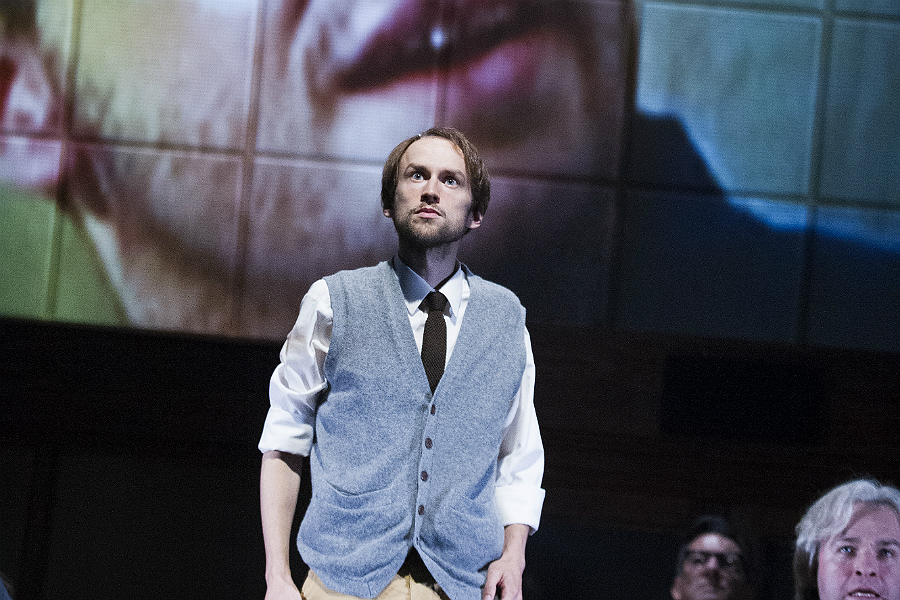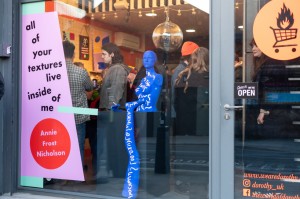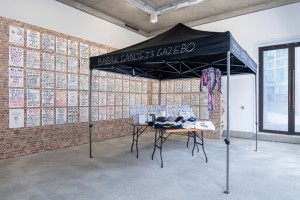1984 – Reviewed

Amid the realities of wikileaks and spying on allies at the highest levels, Orwell’s dystopian vision seems pertinent as ever, says Fred Johnson…
What to expect of a new adaptation of Orwell’s famous, politically questioning novel, 1984? More pertinently, how to engage a media-savvy modern day audience, maintaining relevance without going too far?
The well-regarded Headlong Theatre Company successfully answered these questions and, in so doing, presented the most memorable, intelligent, and innovative play I have seen in recent memory.
Of course, such praise needs context and justification; here goes.
Much emphasis was placed on conveying Winston Smith as an everyman and any-man; the third wall was repeatedly crossed in a series of metatheatrical manoeuvres, throwing Winston from one alternative reality into another, all to the tune of such repeated mantras as “the book is a mirror for any generation that looks into it” and “Winston is anyone; everyone even”.
Immediately then the play did an excellent job of directly engaging and involving the audience, by placing us alongside Winston as much-jostled and confused readers of the text suddenly drawn into a terrifying and oppressive narrative we could neither freely navigate or change in any way.
“You have always known, Winston,” says O’Brien softly, menacingly, over the action, and so we have; 1984 is not a new text, and the story is known (however loosely) by great swathes of people, even if they haven’t read it.
Rather than let this hang over them, directing and writing duo Robert Icke and Duncan Macmillan have turned this knowledge against the audience, just as O’Brien turns Winston’s true knowledge against him in Room 101; the audience finds themselves trapped in the narrative and legacy of 1984, viewing the same scenes, slightly changed, over and over.
The same iconic lines are announced in the same tone again and again, only in different contexts; this audience recognition lends the narrative an unsteady sense of security, only for the directors to expertly sweep the rug from underfoot every time, leaving a sense of unease, fear, and discomfort.
Like Winston, we find ourselves trapped in a familiar cycle of events; unlike Winston however, we are left with an uneasy feeling as to why the whole thing seems so familiar.
Central to the play’s quality is the manipulation of sound, light, and film. Eschewing more traditional theatrical techniques, 1984 grounds itself as truly contemporary through its attritional onslaught of audio-visual elements.
The two-minutes hate was one of the most chilling scenes I have ever sat through in a theatre, with the characters sat in a line screaming obscenities into the audience as party slogans and the live execution of a thought criminal buzzed through the stage-wide screen. Increasingly loud white noise and recited mantras blared out as the scene progressed, culminating in a sobbed celebration of Big Brother and the announcement of The Party’s three slogans.

Echoes of Michael Radford’s film starring John Hurt reverberated throughout, but the scene was far more focused on Winston’s personal experience; his thoughts were conveyed through cuts in the action, direct tableaus where the scene would break and Winston would examine the insanity that raged around him.
Later on in the play when Winston finds himself at the mercy of O’Brien’s torture team, sound is aggressively used to subdue and oppress the audience; painfully loud buzzing noises shred through stage-side speakers during stage blackouts, tensing muscles and sending shivers down spines.
In this way 1984 was not merely a visual experience, rather a complete assault on the senses; like Winston and the population of Air Strip One, the audience is left completely cornered. Flashing lights and distortion accompany the invading thought police as they burst into the antique shop to arrest Winston and Julia, and, similarly, Winston’s torture rang out with harsh buzzes and flashes of white light.
That this occurs during scenes of Party brutality leads the audience to, subconsciously, attribute the violent use of light and sound with The Party, tying the narrative oppression with their own tense discomfort. This results in a kind of Pavlovian response; audience members learning to distrust and fear harsh sounds and bright light, and, as with everything else, The Party uses this to their advantage.
Of course, a play is only as good as the actors in it. Thankfully, 1984 boasts a talented and varied cast who, generally, fall into their roles near-on perfectly. Stand-outs include Matthew Spencer, as the sardonic and sly Syme, Gavin Spokes as the oafish Parsons, and of course Mark Arends’ Winston. Worthy of special mention is Tim Dutton’s O’Brien: at once charming, terrifying, and absolutely single-minded in his belief in Ingsoc.
Adapting such a beloved and culturally significant text as 1984 for the stage must have been no easy task, and, if nothing else, Headlong should be commended on their bravery in undertaking such a feat. The fact that they’ve actually pulled it off is astounding, and Icke and Macmillan should be applauded for the incredible work they’ve done here.
I’ve tried to avoid talking about the narrative flow too much here, as this is arguably where the true genius lies, and it’s best to go in knowing as little as possible. But don’t take my word for it; 1984 is a beautifully crafted, intelligent, entertaining, engaging, visceral, and terrifying feat of theatre, and you owe it to yourself to see it. Highly recommended.
Fred Johnson
Image © Tristram Kenton
Headlong Theatre Company’s 1984 continues its UK tour this week





